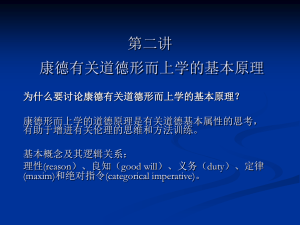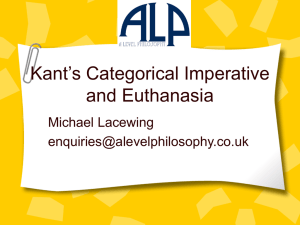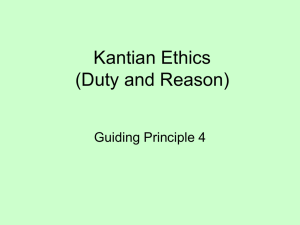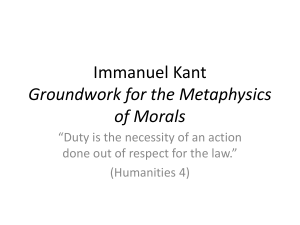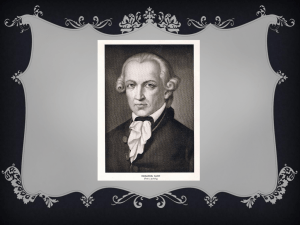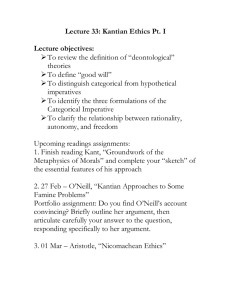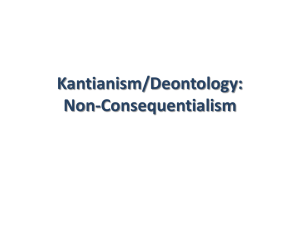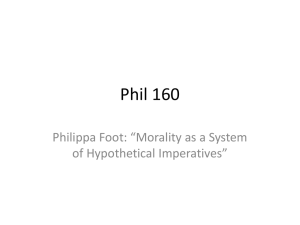to a metaphysics of morals
advertisement
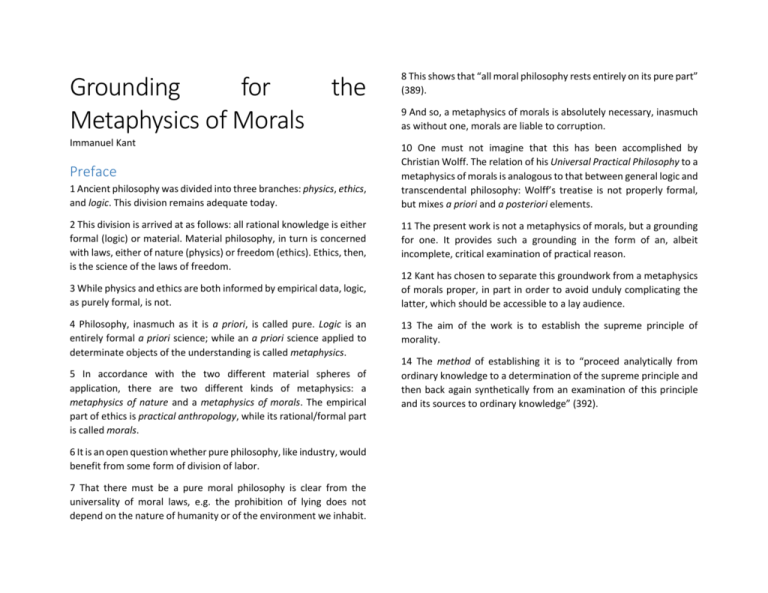
Grounding for the Metaphysics of Morals 8 This shows that “all moral philosophy rests entirely on its pure part” (389). Immanuel Kant 10 One must not imagine that this has been accomplished by Christian Wolff. The relation of his Universal Practical Philosophy to a metaphysics of morals is analogous to that between general logic and transcendental philosophy: Wolff’s treatise is not properly formal, but mixes a priori and a posteriori elements. Preface 1 Ancient philosophy was divided into three branches: physics, ethics, and logic. This division remains adequate today. 2 This division is arrived at as follows: all rational knowledge is either formal (logic) or material. Material philosophy, in turn is concerned with laws, either of nature (physics) or freedom (ethics). Ethics, then, is the science of the laws of freedom. 3 While physics and ethics are both informed by empirical data, logic, as purely formal, is not. 4 Philosophy, inasmuch as it is a priori, is called pure. Logic is an entirely formal a priori science; while an a priori science applied to determinate objects of the understanding is called metaphysics. 5 In accordance with the two different material spheres of application, there are two different kinds of metaphysics: a metaphysics of nature and a metaphysics of morals. The empirical part of ethics is practical anthropology, while its rational/formal part is called morals. 6 It is an open question whether pure philosophy, like industry, would benefit from some form of division of labor. 7 That there must be a pure moral philosophy is clear from the universality of moral laws, e.g. the prohibition of lying does not depend on the nature of humanity or of the environment we inhabit. 9 And so, a metaphysics of morals is absolutely necessary, inasmuch as without one, morals are liable to corruption. 11 The present work is not a metaphysics of morals, but a grounding for one. It provides such a grounding in the form of an, albeit incomplete, critical examination of practical reason. 12 Kant has chosen to separate this groundwork from a metaphysics of morals proper, in part in order to avoid unduly complicating the latter, which should be accessible to a lay audience. 13 The aim of the work is to establish the supreme principle of morality. 14 The method of establishing it is to “proceed analytically from ordinary knowledge to a determination of the supreme principle and then back again synthetically from an examination of this principle and its sources to ordinary knowledge” (392). First Section: transition from the ordinary rational knowledge of morality to the philosophical (393-405) I Kant states his thesis: only the good will is good in itself (393-394) 1 According to Kant, only the will is truly good, since every other good depends on the good will, and becomes bad in its absence. 2 Even qualities conducive to a good will are themselves only good inasmuch as they presuppose a good will. 3 The good will is not good on account of what it effects, but is good in itself. II Kant examines the thesis against contrary opinions (394396) 4 The thesis that only the will is good, however intuitive, is still somewhat surprising, and needs to be further examined. 5 Kant refutes the opinion that happiness is the main good by recourse to the efficacy of nature, since this good would have been better procured by instinct than by reason. 6 It is even the case that the more reason put to the purpose of obtaining happiness, the more miserable a person becomes. 7 But while reason cannot produce a will good for the sake of obtaining a further end, it can serve to produce a will good in itself. III Kant explicates the notion of the good will (397-404) 8 The notion of a good will will be explicated via an elucidation of the concept of duty. III.i. Delineation of the scope of inquiry (397) 9 In doing so, certain cases must be omitted: among them i) cases of actions contrary to duty, and ii) cases where an action in accord with duty is performed from purely selfish motives, as when, e.g. a dishonest shopkeeper does not overcharge inexperienced customers. The main case to be examined is iii) that wherein an action is done in accord with duty, but also from an immediate inclination to perform the action. III.ii Exposition of the concept of duty (397-401) III.ii.1 examples contrasting actions performed out of duty and actions performed in accordance with duty (397-399) 10 For example, most people desire to preserve their lives; they also have a duty to do so; but only the person who preserves his life from duty, e.g. the despondent person contemplating suicide and deciding against it, acts in a moral manner. 11 Similarly, a person with a beneficent constitution does not act morally when she gives, whereas one who lacks this constitution does. 12 Thirdly, to secure one’s own happiness is a duty, but most do not aim to do so out of duty. Only when one aims to secure this happiness out of duty does the will to be happy attain moral stature. III.ii.2 Propositions drawn from the above examples (399-401) 13 These examples show us that the scriptural command to love one another must be understood in a volitional, and not an affective, sense. I) “Only [...] practical love can be commanded.” (399) 14 ii) “An action done from duty has its moral worth, not in the purpose that is to be attained by it, but in the maxim according to which the action is determined.” (399) 15 iii) “Duty is the necessity of an action done out of respect for the law” (400). This proposition follows from the previous two. 16 In short, the moral worth of an action lies not in the expected effect, but in the representation of the law in itself. III.iii Explication of the notion of law involved in the aforementioned concept of duty; the categorical imperative (402-403) III.iii.1 Statement of the Categorical Imperative (402) 17 The will must not obey particular laws, but lawfulness as such. III.iii.2 Examples concerning the maxim of conformity to law (402403) 18 That lying in distress is not in conformity with universal law. III.iii.3 Summary (403) 19 i) Respect is an estimation of a worth outweighing any inclination; ii) duty is the necessity of acting from pure respect for the practical law; iii) duty is the condition of a will good in itself. IV Closing remarks (403-405) 20 Comparison between theoretical and practical reason: whereas theoretical reason at its height leads to contradictions, practical reason merely elucidates common sense. 21 The source of the corruption of laws is the internal dialectic between reason and inclination. 22 Thereby, even ordinary practical reason is led to philosophy. Second section: transition from popular moral philosophy to a metaphysics of morals (406445) I Justification of the transition (406-412) 1 Even though the concept of duty sketched has been taken from everyday cases, it is not thereby an empirical concept: we have no indubitable experience of seeing anyone acting from pure duty. 2 Moreover, even when we examine our own actions and find no other motive in them, we cannot be certain that we are acting from duty alone, and not some hidden motive. 3 To hold that our concept of duty is drawn from experience is to concede the moral sphere to skeptics. Whereas for Kant, duty makes demands on us that have perhaps never been faithfully carried out in the history of the world. 4 Furthermore, the claim that morality is empirical is in conflict with the absolutely necessary character of moral laws. 5 And morality cannot be based on examples, because examples themselves are judged for their conformity to moral principles. 6 In sum, morality itself demands we move from popular morality to a metaphysics of morals. 7 Philosophy must prefer clear insight to the patchwork observations of popular morality. 8 Popular morality confuses many principles of action – fear of God, happiness, duty, human nature, etc. It does not even begin to ask whether moral concepts must be sought in a wholly non-empirical way. 9 A pure metaphysics of morals also aids morality itself: we are more impressed by depicting an action done from pure duty than by one arising from mixed motives. 10 Metaphysical principles cannot be abstracted from merely contingent experience. And so, even for ordinary morality, a metaphysics of morals is necessary. II Transition from popular philosophy to a metaphysics of morals (412-420) II.i The nature and kinds of imperatives (412-417) 11 The transition embarked on in this part is not that from ordinary morality to philosophy (which was accomplished in the first part), but from popular morality (which allows for an empirical part) to a metaphysics of morals (which is pure). 12 The rational will is nothing other than the capacity to act in accordance with a conception of law, i.e. it is nothing other than practical reason. The relation of law to a subject may be both subjective and objective, and therefore sufficient, or it may be merely objective, in which case it is objectively necessary but subjectively contingent. 13 “The representation of an objective principle insofar as it necessitates the will is called a command, and the formula of a command is called an imperative” (413). 14 Every imperative is expressed by an ought. An imperative determines the will by an objective representation of reason, rather than by a subjective sensation. 15 Imperatives only apply to human willing on account of its subjective imperfection: though a perfectly holy or even divine will is subject to objective law, it would thus be out of place to think of it as subject to an ought. 16 “All imperatives command either hypothetically or categorically” (414). 17 Every imperative represents a possible action as good, therefore necessary for a rational subject. If it is represented as a means, it is hypothetical; if as an end, it is categorical. 18 “An imperative thus says what action possible to me would be good, and it presents the practical rule in relation to a will which does not forthwith perform an action simply because it is good” (414). 19 A hypothetical imperative states that an action is good for obtaining a given end. 20 Hypothetical imperatives are important for the constitution of the sciences as well as the rearing of children. 21 Inasmuch as all rational beings are essentially ordered to happiness, one particularly important hypothetical imperative is that of prudence, i.e. the necessity of securing given means to achieve the end of one’s happiness. This, however, remains hypothetical. 22 There is only one categorical imperative, concerned not with the matter or result of an action, but with its form and principle. 23 In short, the will has three kinds of principles: 1) rules of skill, which belong to art, 2) counsels of prudence, which belong to welfare 3) commands (laws) of morality, which belong to morality. II.ii The ground of their possibility (417-420) 24 The possibility of technical imperatives is analytically contained in the end sought. 25 Similarly, counsels of prudence would be a priori, if only the concept of happiness were determinate (it isn’t). Duty To oneself 26 Commands of morality, by contrast, are neither pragmatic nor empirical. To others 27 And so categorical imperatives are given unconditionally and entirely a priori. 28 More specifically, the categorical imperative is a synthetic a priori proposition. III Elucidation of the categorical imperative (420-437) III.i. Its content (420-424) III.i.1 in itself (420-21) 29 Question: does the concept of a categorical imperative also “supply us with the formula containing the proposition that can alone be a categorical imperative” (420)? 30 Answer: yes. The content of the categorical imperative is contained in the demand that it be necessary qua subordination to law. 31. “There is only one categorical imperative and it is this: Act only according to that maxim whereby you can at the same time will that it should become a universal law” (421). 32 The categorical imperative may also be expressed thus: “Act as if the maxim of your action were to become through your will a universal law of nature” (421). III.i.2 in its division and applications (421-424) 33 Kant proffers the following division of duties, providing examples in the following paragraphs: Perfect e.g. Don’t kill yourself e.g. Don’t make empty promises Imperfect e.g. develop your talents e.g. help those in need 34 (1) Committing suicide violates one’s duty to oneself. The maxim upon which the action rests (i.e. one may kill oneself out of self-love) is contradictory, inasmuch as it assumes the existence of a power for life that becomes a power for death. 35 (2) Making empty promises violates one’s duty to others. “The universality of a law which says that anyone believing himself to be in difficulty could promise whatever he pleases with the intention of not keeping it would make promising itself and the end to be attached thereby quite impossible” (422). 36 (3) Though, as a system of nature, it is possible that individuals neglect their natural gifts and live idly; but it is not possible for a rational being to will this, since “a rational being ... necessarily wills that all his faculties should be developed” (423). 37 Not to help others in need violates one’s duty to others. “even though it is possible that a universal law of nature could subsist in accordance with that maxim, still [...] a will which resolved in this way would contradict itself, inasmuch [it might often] have need of the love and sympathy of others” (423). 38 “Some actions [i.e. those contrary to perfect duties, also called irremissible duties] are so constituted that their maxims cannot without contradiction even be thought as a universal law of nature, much less be willed as what should become one. In the case of others [i.e. those contrary to imperfect duties, also called meritorious duties] this internal impossibility is indeed not found, but there is still no possibility of willing that their maxim should be raised to the universality of a law of nature, because such a will would contradict itself” (424). 39 Violations of duty presuppose universal law, inasmuch as the violator must will that others obey it in order for his violation to work. III.ii. Its existence (425-430) III.ii.1 The existence of a categorical imperative (425-429) 40 The above elucidates 1) that duties can only reside in categorical, and not hypothetical, imperatives; and 2) what the content of a categorical imperative is for any given application. We must now show that there is such a categorical imperative. 41 The existence of the categorical imperative cannot be derived from anything peculiar to human nature, but must be derived from the nature of rationality as such. 42 without such a source, rational principles would not exist. 43 Hence everything empirical is unfitting and even detrimental to moral principles 44 The question to be investigated is as follows: “is it a necessary law for all rational beings always to judge their actions according to such maxims as they can themselves will that such should serve as universal laws? If there is [...], then it must already be connected [...] with the concept of the will of a rational being in general” (426). 45 Will ≝ “a faculty of determing itself to action in accordance with the representation of cetain laws” (427). End – the objective ground of a will’s self-determination Means – “that which contains merely the ground of the possibility of [an] action” (427). Incentive – the subjective ground of desires/subjective ends Motive – the objective ground of volitions/objective ends “Practical principles are formal when they abstract from all subjective ends; they are material, however, when they are founded upon subjective ends, and hence upon certain incentives.” (427). The whole worth of material ends consists in the faculty of desire in the subject. Hence, no such subjective principles can be universal. 46 hence, only in something existing as an end in itself can the ground of a categorical imperative exist. 47 But every rational being, and man in particular, exists as an end in itself. Therefore, there is a categorical imperative. Everything that is is either a being (and hence a means) or a person (and hence an end in itself). 48 Given this, the categorical imperative (here called the practical imperative) can also be formulated thus: “Act in such a way that you treat humanity, whether in your own person or in the person of another, always at the same time as an end and never simply as a means.” (429). III.ii.2. The categorical imperative applied in its concrete formulation to the previous examples (429-430) 49 (1) The man who “destroys himself in order to escape from a difficult situation [...] is making use of his person merely as a means so as to maintain a tolerable condition till the end of his life” (429). 50 (2) “the man who intends to make a false promise [...] intends to make use of another man merely as a means to an end which the latter does not likewise hold” (429). 51 (3) regarding the advancement of one’s capacities: “it is not enough that the action does not conflict with humanity in our own person as an end in itself; the action must also harmonize with this end” (430). 52 (4) On the failure to contribute to the happiness of others: “humanity might indeed subsist if nobody contributed anything to the happiness of others [...]. But this [...] would harmonize only negatively [...] with humanity as an end in itself. [...] For the ends of any subject who is an end in himself must [...] be my ends also, if that conception of an end in itself is to have its full effect on me” (430). III.iii its unified formulation: the formulas of autonomy and of the kingdom of ends (430-436) III.iii.1 the formula of autonomy (430-433) 53 The objective ground of practical legislation lies in the form of universality; the subjective, in the end [i.e. in humanity]; combined, this gives us “the third practical principle of the will as the supreme condition of the will’s conformity with universal practical reason, viz., the idea of the will of every rational being as a will that legislates universal law.” (431). 54 “According to this principle all maxims are rejected which are not consistent with the will’s own legislation of universal law” (431). 55 What this final formulation adds is the indication that the renunciation of self-interest is what distinguishes a categorical from a hypothetical imperative. 56 Though a will subject to law may be bound by some interest, a supreme lawgiver as such cannot be. 57 The present formulation is thus suited to show that there is a categorical imperative only if that imperative commands that the will have only itself qua universal legislator as object. 58 All previous attempts at grasping the principle of morality failed because they failed to see that “man is subject only to his own, yet universal legislation” (432). III.iii.2 The formula of the kingdom of ends (433-436) 59 The concept of every rational being as a legislator legislating for itself leads to the (Leibnizian) idea of the kingdom of ends. 60 A kingdom of ends is thought of as “a whole of all ends in systematic connection (a whole of both rational beings as ends in themselves and also of the particular ends which each may set for himself)” (433). 61 Formula of the kingdom of ends: “Each [rational being] should treat himself and all others never merely as a means but always at the same time as an end in himself.” 62 “A rational being belongs to the kingdom of ends as a member when he legislates in it universal laws while also being himself subject to these laws. He belongs to it as a sovereign, when as legislator he is himself subject to the will of no other”(433) 63 “A rational being must always regard himself as legislator in a kingdom of ends rendered possible by freedom of the will, whether as member or as sovereign.” (434) 64 “Hence morality consists in the relation of all action to that legislation whereby alone a kingdom of ends is possible” (434). 65 “Reason [...] relates every maxim of the will as legislating universal laws to every other will and also to every action toward oneself” (434). 66 “In the kingdom of ends everything has either a price or a dignity. Whatever has a price can be replaced by something else as its equivalent; on the other hand, whatever is above all price, and therefore admits of no equivalent, has a dignity” (434). 67 “Whatever has reference to general human inclinations and needs has a market price; whatever, without presupposing any need, accords with a certain taste [...] has an affective price; but that whihc constitutes the condition under which alone something can be an end in itself [...] has intrinsic worth, i.e. a dignity” (434-35). 68 Morality and humanity alone have dignity. 69 What makes virtue entitled to its claims is the share that a virtuous disposition affords to a kingdom of ends. IV Summary of this part (436-437) 70 There are three formulations of the categorical imperative, the third of which contains the other two. 1. (71) The form of the maxim is universality, giving rise to the formulation of universal law 2. (72) The matter/end of the maxim is that of the rational being as an end in himself. This gives rise to the formula of humanity. 3. (73) The complete determination of the maxim is that all maxims proceeding from one’s own legislation ought to harmonize with a possible kingdom of ends. This gives rise to the formula of the kingdom of ends. The progression from the first to the third formulation is one from unity to plurality to totality. V Summary of the book up to now (437-445) V.i The different formulations of the categorical imperatives and their relations to each other (437-440) 74 The formula of universal law arises from the concept of an absolutely good will. The formula of the law of nature arises from the analogy of the will as a law for possible actions to “the universal connection of the existence of things in accordance with universal laws, which is the formal aspect of nature in general” (437). 75 The formula of humanity arises from the subjective incentive to will such a being as one’s own end/destiny. 76 “Morality is the relation of actions to the autonomy of the will [...]. That action which is compatible with the autonomy of the will is permitted; that which is not compatible is forbidden. That will whose maxims are necessarily in accord with the laws of autonomy is a holy, or absolutely good, will. The dependence of a will which is not absolutely good upon the principle of autonomy (i.e. moral necessitation) is obligation [...]. The objective necessity of an action from obligation is called duty. 77 The person who fulfills all his duties is not sublime because he is subject to the law, but because he is at the same time legislates that law. V.ii Autonomy of the Will as the Supreme Principle of Morality (440) 78 “Autonomy of the will is the property that the will has of being a law to itself” (440). V.iii Heteronomy of the will as the source of all spurious principles of morality (441) 79 Every spurious principle of morality holds something other than the will itself as its source V.iv Classification of all possible principles of morality founded upon the assumed fundamental concept of heteronomy (441445)
